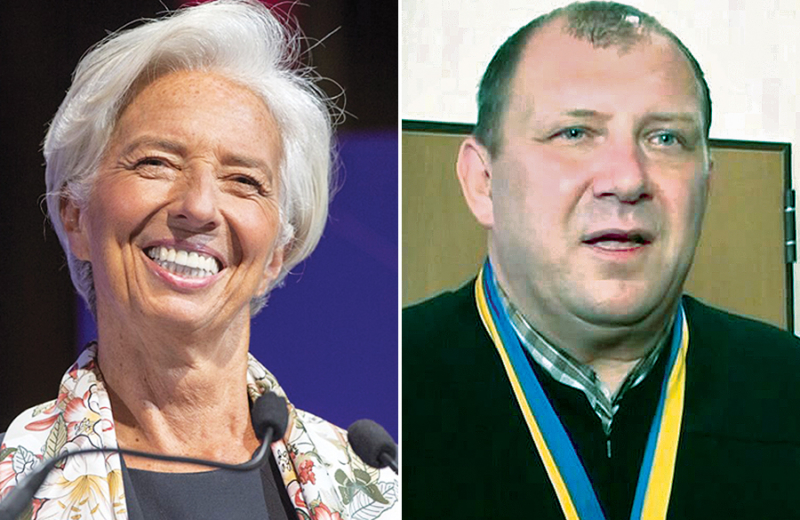Reformer of the week – Christine Lagarde
Christine Lagarde, head of the International Monetary Fund, met with Ukrainian President Petro Poroshenko during the World Economic Forum in Davos on Jan. 26 to discuss, among other things, the creation of an anti-corruption court.
After blocking the anti-graft court’s creation for more than a year, Poroshenko submitted a bill in December, under Western and public pressure, to set up the court.
However, in January the IMF, the World Bank, the European Union and the European Commission for Democracy through Law, better known as the Venice Commission, criticized Poroshenko’s bill.
The IMF and the World Bank said that Ukraine’s foreign partners and donors should have a crucial role in approving the appointment of anti-graft judges, rather than just an advisory one, as envisaged in Poroshenko’s bill.
However, Ukrainian pro-government media and bloggers, including Karl Volokh, Viktor Ukolov and Taras Chornovil, spread fake news that the IMF and the World Bank had caved in to Poroshenko’s version of the anti-graft court bill and accepted it. The fake was uncovered on Jan. 31 by the Yevropeiska Pravda newspaper, which cited IMF and World Bank representatives as denying the claim.
Pro-Poroshenko bloggers and media also spread fake news that Satu Kahkonen, the World Bank’s regional director, had been fired because of the harsh tone of her letter to Ukrainian top officials on the anti-corruption court.
The trust in Ukraine’s judiciary was further damaged as it was revealed on Feb. 2 that Valentyna Simonenko, a nominee for the new Supreme Court, registered as a Russian taxpayer in Russian-annexed Crimea in 2015, according to the official register of Russia’s Federal Tax Service checked by the Kyiv Post.
Anti-reformer of the week – Oleh Prysyazhnyuk
Kyiv Court of Appeal Judge Oleh Prysyazhnyuk on Jan. 26 placed ex-Georgian President Mikheil Saakashvili under nighttime house arrest in what the politician believes to be a vendetta by President Petro Poroshenko.
Prysyazhnyuk upheld a verdict in a criminal case against Yuriy Lutsenko – then an opposition politician and now prosecutor general – in 2012. That case has been recognized by Ukrainian and European authorities to have been politically motivated. David Sakvarelidze, a Saakashvili ally, said on Dec. 17 that Lutsenko would use Prysyazhnyuk’s background to pressure him in the Saakashvili case.
In April, Prysyazhnyuk also released from custody police officer Vitaly Honcharenko, who has been charged with murdering EuroMaidan Revolution protesters, after which the officer fled to Russia.
Prysyazhnyuk and two other judges who put Saakashvili under house arrest, Denys Masenko and Viktor Hlynyany, have been accused of having links to Poroshenko ally and lawmaker Oleksandr Hranovsky, who denies this. They have regularly made decisions in favor of the authorities, including in hearings against opposition politicians Gennady Korban and Igor Mosiychuk.
In 2016 Hlynyany’s son was appointed to a prosecutor’s office department that is claimed to have links to Hranovsky, and he was previously responsible for cases heard by the Kyiv Court of Appeal, where his father works. This has prompted accusations of a conflict of interest.
Hlynyany and his family own seven apartments and four houses in Kyiv, according to his asset declaration. The judges deny accusations of wrongdoing.
Masenko has been transferred from a court in Russian-occupied Luhansk to Kyiv by Poroshenko, which has been interpreted by critics as a move that guarantees political loyalty.
Lutsenko has accused Saakashvili of accepting funding from Serhiy Kurchenko, an ally of ex-President Viktor Yanukovych, to finance anti-government demonstrations and plot a coup d’etat.
The prosecutors’ alleged evidence against Saakashvili was dismissed by independent lawyers as very weak, and he was released by Pechersk Court Judge Larysa Tsokol on Dec. 11. Tsokol ruled that Saakashvili’s detention by the Security Service of Ukraine, or SBU, without a court warrant and any other legal grounds on Dec. 5 was unlawful.
Meanwhile, the Kyiv Administrative Court of Appeal on Feb. 1 delayed hearings on rejecting Saakashvili’s asylum application until Feb. 5. Saakashvili, who plans a major anti-Poroshenko rally for Feb. 4, says the rejection could trigger his unlawful deportation or extradition.



